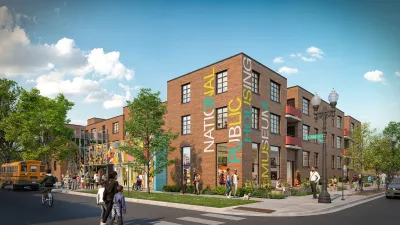With the backing of powerful nonprofit and for-profit investors, the Housing Partnership Equity Trust is making waves with its triple bottom line approach to affordable housing. More importantly, it’s making money.

Armed with funding from the private sector, the Housing Partnership Alliance is pioneering a new way to create affordable homes and stave off gentrification. Their Housing Partnership Equity Trust (HPET) is a for-profit investment vehicle that purchases and retrofits property and then preserves low rents. By leveraging financial clout alongside the neighborhood know-how of local housing nonprofits, the HPET can compete with major developers to close property deals.
The article discusses the HPET’s newest acquisition, Damen Court on the Near West Side of Chicago, which it purchased for approximately $15 million. For each project, HPET partners with a local nonprofit, in this case the Hispanic Housing Development Corporation. By preserving affordability and increasing energy efficiency in its properties, the HPET pursues a triple bottom line investment strategy: profit, social justice, and environmental sustainability.
The HPET has received investment backing from Ford and Prudential along with credit from Citibank and Morgan Stanley. In spite of several challenges, including a rate of return that is hovering 2.5% below the average for U.S. real estate investment trusts, the HPET is making money. Leadership appear confident the trust can sustain itself long-term. Although the HPET collaborative system is still experimental, it may prove to be a profitable way to preserve mixed-income urban communities.
FULL STORY: Using Wall Street Tactics to Preserve Affordable Housing

Planetizen Federal Action Tracker
A weekly monitor of how Trump’s orders and actions are impacting planners and planning in America.

Map: Where Senate Republicans Want to Sell Your Public Lands
For public land advocates, the Senate Republicans’ proposal to sell millions of acres of public land in the West is “the biggest fight of their careers.”

Restaurant Patios Were a Pandemic Win — Why Were They so Hard to Keep?
Social distancing requirements and changes in travel patterns prompted cities to pilot new uses for street and sidewalk space. Then it got complicated.

Platform Pilsner: Vancouver Transit Agency Releases... a Beer?
TransLink will receive a portion of every sale of the four-pack.

Toronto Weighs Cheaper Transit, Parking Hikes for Major Events
Special event rates would take effect during large festivals, sports games and concerts to ‘discourage driving, manage congestion and free up space for transit.”

Berlin to Consider Car-Free Zone Larger Than Manhattan
The area bound by the 22-mile Ringbahn would still allow 12 uses of a private automobile per year per person, and several other exemptions.
Urban Design for Planners 1: Software Tools
This six-course series explores essential urban design concepts using open source software and equips planners with the tools they need to participate fully in the urban design process.
Planning for Universal Design
Learn the tools for implementing Universal Design in planning regulations.
Heyer Gruel & Associates PA
JM Goldson LLC
Custer County Colorado
City of Camden Redevelopment Agency
City of Astoria
Transportation Research & Education Center (TREC) at Portland State University
Camden Redevelopment Agency
City of Claremont
Municipality of Princeton (NJ)





























